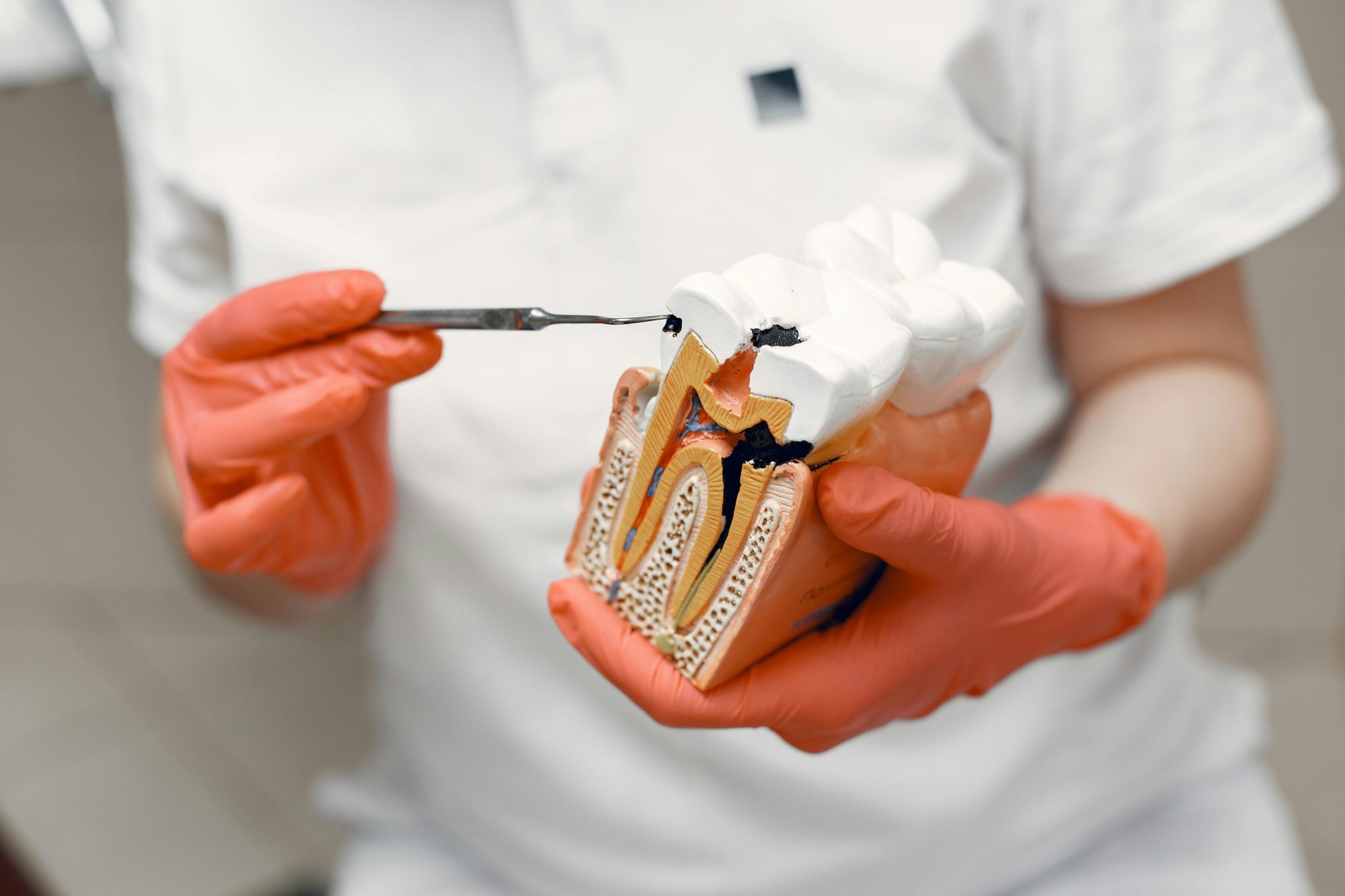What Is an Endodontist?
An endodontist is a dental specialist who focuses on saving teeth through advanced root canal treatment and related procedures. The word endodontic means “inside the tooth.” These specialists receive two to three additional years of training beyond dental school to treat issues affecting the pulp — the living tissue inside your teeth.
At Gold Coast Dental, our endodontists use modern microscopes and 3D imaging to diagnose and treat nerve infections accurately. The goal isn’t just to stop pain — it’s to save your natural teeth for life.
What Does an Endodontist Actually Do?
An endodontist performs treatments that repair and preserve damaged or infected teeth. The most common procedure is a root canal, which removes diseased pulp tissue, disinfects the canal, and seals it to prevent reinfection.
Here’s what you can expect:
- Diagnosis & X-rays: Identify infection or nerve damage.
- Anesthesia: The area is numbed for a painless experience.
- Cleaning & Shaping: The pulp is removed, and the canals are disinfected.
- Filling & Sealing: The canals are sealed with a biocompatible material.
- Restoration: A crown protects the treated tooth for long-term strength.
If you delay treatment, infection can spread, causing abscesses or bone loss. Fortunately, a skilled endodontist can often save even severely damaged teeth.
What Is Root Canal Treatment (and Why It Matters)

Root canal therapy — also known as endodontic treatment — restores a tooth that would otherwise be lost to infection. It involves removing the inflamed pulp, cleaning the inside of the tooth, and sealing it to prevent further issues.
You might need a root canal if you have:
- Severe pain while chewing or touching the tooth
- Prolonged sensitivity to heat or cold
- Swelling near the gums
- Cracks or deep cavities
According to Gold Coast Dental Specialties – Endodontics, modern root canal therapy is virtually painless and has a success rate of over 95%. Your nerve is only sensory — meaning after treatment, your tooth still functions normally.
When Should You See an Endodontist?
You should consider visiting an endodontist when:
- Pain persists even after a filling or crown
- Your dentist detects a deep cavity near the nerve
- You experience swelling, abscess, or gum tenderness
- A previously treated tooth becomes painful again
At Gold Coast Dental Locations, patients often begin with their general dentist, who may refer them to an endodontist for specialized care. The sooner you act, the more likely you are to save your tooth and avoid more invasive treatments like implants.
Endodontist vs. General Dentist
Both professionals care for your teeth, but an endodontist has deeper expertise in root canal therapy and pain management.
|
Aspect |
General Dentist |
Endodontist |
|
Training |
Dental degree |
+2–3 years in endodontics |
|
Focus |
Prevention, fillings, crowns |
Root canals, retreatments, apicoectomies |
|
Tools |
Standard instruments |
Microscopes, ultrasonic tips, digital imaging |
|
Typical Patients |
Routine care |
Complex or re-treated teeth |
While most general dentists can perform a root canal, endodontists manage more complex or high-risk cases — offering higher precision, comfort, and long-term success.
What’s the Difference Between a Periodontist and an Endodontist?
- Endodontist: Focuses on what’s inside the tooth — the pulp, root, and nerve tissues.
- Periodontist: Focuses on what’s around the tooth — the gums, bone, and supporting structures.
If your pain is due to gum disease or bone loss, you may see a periodontist. If it’s due to nerve infection, an endodontist is your specialist.
Pediatric Endodontist: Caring for Children’s Smiles
Children sometimes need root canal therapy too — especially after trauma or deep cavities in baby teeth. A pediatric endodontist ensures comfort and proper development by performing gentle treatments such as pulpotomy (partial nerve removal) and apexogenesis (helping roots continue to grow).
Emergency Endodontist Near Me
A severe toothache that keeps you awake, swelling on your face, or sensitivity to pressure may signal an urgent pulp infection.
An emergency endodontist can provide same-day treatment, relieving pain and saving your tooth from extraction.
Delaying care risks spreading infection, which can lead to systemic issues or hospitalization. Quick action protects both your dental and overall health.
Endodontist That Accepts Medicaid
Many patients ask, “Can I find an endodontist who accepts Medicaid?”
The answer is yes — several clinics and dental networks, including Gold Coast Dental, offer options for Medicaid, PPO, and affordable payment plans.
Always confirm your eligibility before the visit to ensure smooth billing.
Why Root Canal Treatment Shouldn’t Be Delayed

Postponing a root canal allows infection to spread deeper into the bone or surrounding tissue. This may cause severe pain, abscess formation, or even tooth loss. Modern endodontic techniques make treatment faster and far more comfortable than before — many patients say it feels similar to getting a simple filling.
Benefits of Seeing a Skilled Endodontist
- Pain-Free Experience: Local anesthesia and advanced technology ensure comfort.
- Cost-Effective Solution: Root canals are more affordable than tooth replacement.
- Prevents Infection Spread: Stops bacteria from damaging nearby teeth and bone.
- Protects Natural Teeth: Preserves the structure for better chewing and long-term health.
- Improves Quality of Life: Restores your ability to eat, smile, and speak without pain.
Aftercare and Recovery Tips
After root canal treatment:
- Take prescribed medications on time.
- Avoid chewing hard foods until your crown is placed.
- Brush gently and maintain regular dental checkups.
- If you notice swelling, fever, or persistent pain, contact your endodontist immediately.
With good care, your treated tooth can last a lifetime.
Frequently Asked Questions
1. What does an endodontist do to your tooth?
An endodontist removes the infected or damaged pulp, disinfects the canals, and seals the tooth to stop pain and prevent reinfection.
2. Is a root canal painful?
No. With modern anesthesia and tools, a root canal usually feels like getting a filling. Most patients feel relief right after.
3. How do I know if I need an endodontist or a dentist?
See your dentist for routine care. See an endodontist if you have severe tooth pain, lingering sensitivity, swelling, or a tooth that needs advanced root canal therapy.
4. Can a tooth heal without a root canal?
No. Once the pulp is infected or dead, it won’t heal on its own. Only a root canal or extraction removes the infection.
5. Do endodontists treat children?
Yes. Pediatric endodontists treat baby and young permanent teeth to preserve growth and prevent early tooth loss.
6. What happens if you delay seeing an endodontist?
The infection can spread, causing abscesses, bone damage, or tooth loss. Early treatment saves time, money, and discomfort.
Final Thoughts
An endodontist plays a critical role in preserving your natural smile. Whether you’re dealing with deep decay, trauma, or post-treatment pain, early evaluation prevents complications and keeps your teeth healthy for decades.
If you suspect nerve infection or tooth pain, book a consultation with the specialists at Gold Coast Dental or visit one of our nearby locations for personalized care. You can also explore advanced treatments at Gold Coast Dental Specialties – Endodontics for expert-level solutions.





















